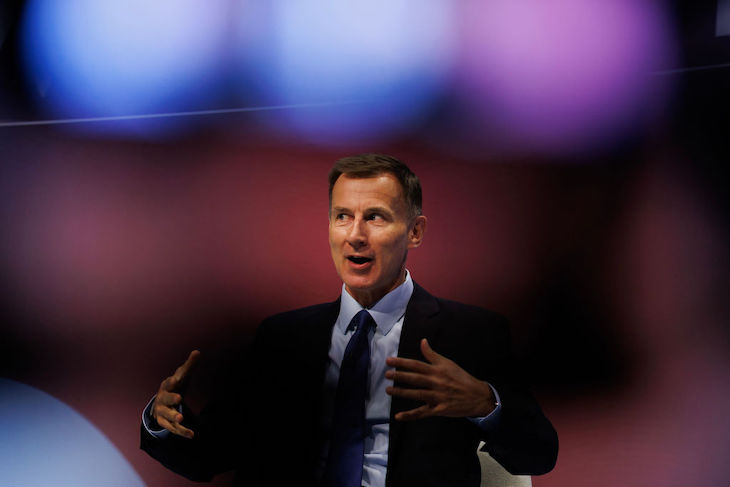Jeremy Hunt is one of the few Tories willing to take the fight to Labour while the Conservative leadership contest drones on. The shadow chancellor gave an on-stage interview at party conference in Birmingham this morning where he continued to attack Chancellor Rachel Reeves’ ‘£22 billion black hole’ narrative. Hunt suggested that not even Labour MPs and members believed that claim, which was why they were having such a big row over the winter fuel payment.
‘We were trounced at the election,’ Hunt said
Hunt also warned that Labour was in danger of making decisions based on its own ‘propaganda’, telling Daniel Finkelstein:
‘My worry is that Labour believes its own propaganda and starts taking a whole series of decisions particularly on things like capital gains tax which have a massive impact on deterring the investment in the economy that we really need.’
He argued that public sector pay rises would be reducing productivity because nothing was asked for in return: ‘That is not taking a difficult decision, that is ducking a difficult decision on the issue – productivity – that economists say is the most important issue,’ he said. The shadow chancellor also argued that ‘people are beginning to worry if Labour have a plan at all’, and that the row over the winter fuel payment had been such a mess that it could make wider welfare reform ‘untouchable’ for the party.
The problem for the Conservatives is that the public rejected them for not having a plan for the issues facing Britain, either, and Hunt was very clear about this. He said the party needed to show voters that it had a serious plan, not offer easy answers:
‘We were trounced at the election. We got ourselves into a position where – and this is a very uncomfortable thing for Conservatives – people looked at the problems the country faced, the problems in the NHS, the cost of living crisis, all these things, challenges with immigration and they began to think that we were part of the problem, not part of the solution.’
The Conservative party, he said, needed to earn back voters’ trust and ‘show that we have listened’, before launching into a rather pointed argument about the dangers of a ‘narrow political strategy’ of targeting certain groups of voters, which would mean ‘people will think we are still thinking about ourselves and not the country’. Though he praised the ‘four outstanding leadership candidates’ for doing serious thinking, he is clearly still worried that the party will fall into the trap of talking to those small groups, rather than to the country.







Comments